Dear Coalición de Derechos Humanos Supporter,
Thanks to your support and the hard work of all of our dedicated volunteers, we can look back on 2015 with pride. This year was an important yet challenging one, but one thing is certain— without your continued financial contributions we couldn’t have successfully supported workers in reclaiming over $18,000 in stolen wages, collaborated with other national and local groups in the fight to end Operation Streamline, and answered over 100 calls per month from family members looking for lost loved ones.
For the past 22 years, we at Derechos Humanos continue to do a lot with very little, and this past year was no exception. In 2015, we had only two part-time staff members at any given time, and therefore relied mostly on our dedicated volunteers to help us accomplish all of the above. Grassroots organizations like Derechos cannot always rely on grant funding to sustain its projects, pay for its staff, rent, the phone system, and other equipment because we refuse to compromise our values. Unfortunately, being principled can make it more difficult for us to secure continued funding from reliable sources. Thankfully, funders like Ben & Jerry’s and Left Tilt have helped us throughout the year. But most important of all, almost half of our annual income comes from donors like you—that is grassroots fundraising at its best!
And we don’t plan on giving up the fight in 2016. However, we absolutely cannot keep fighting without your enduring support—yes, your financial support, but also your volunteer hours and willingness to read and share the timely news coming from the border region through our listserve. Please consider how far we will stretch each dollar that you are able to donate or each hour you are able to volunteer (for more information about how to volunteer—even if you don’t live in Tucson, see below).
Your gift of $25, $100, 500, 1,000 or $5,000 can make all the difference. You can donate by going to our website at http://www.derechoshumanosaz.net/ and clicking on the “Donate” button. Or you can send a check in the enclosed envelope or you can sign up for monthly donations with our enclosed form. Please consider being a monthly sustainer and see your donation go a long way. (More details on becoming a sustainer below)
Thank you!
The Derechos Family
Coalición de Derechos Humanos – PO Box 1286, Tucson AZ, 85702 – 520-770-1373 coalicion@derechoshumanosaz.net – www.derechoshumanosaz.net
Highlights of the Year
Our Volunteers!
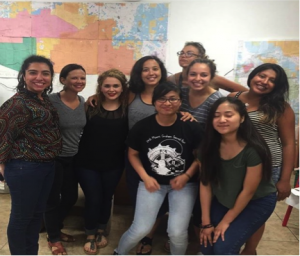 Our greatest highlight of the year is, by far, our volunteers! We are so thankful for the innumerable hours that they dedicated to the work here at Derechos. Thank you to long-term volunteers Amanda Garcés, Genevieve Schroeder, Sandra Gárnica, Jason Aragon, Rachel Frank, Jordan Weiner and Laura Von Dohlen as well as Isabel Ball, Gabrielle Shaw Frida Cota, Sal Amador, Elizabeth Barahona, Ruici Ong, Waldina Villa, and Emily Tedards, Elise Mitchell, Prachi Goyal, and Yaneli Soriano. We could not have accomplished all of the work that we highlight below without you.
Our greatest highlight of the year is, by far, our volunteers! We are so thankful for the innumerable hours that they dedicated to the work here at Derechos. Thank you to long-term volunteers Amanda Garcés, Genevieve Schroeder, Sandra Gárnica, Jason Aragon, Rachel Frank, Jordan Weiner and Laura Von Dohlen as well as Isabel Ball, Gabrielle Shaw Frida Cota, Sal Amador, Elizabeth Barahona, Ruici Ong, Waldina Villa, and Emily Tedards, Elise Mitchell, Prachi Goyal, and Yaneli Soriano. We could not have accomplished all of the work that we highlight below without you.
Volunteer Testimony by Prachi Goyal:
As an intern at Derechos Humanos, on one of my first days, Cristen and Rachel trained me to work on the “Missing Migrant Project”. They give other interns and me a list of about 30 detention centers and asked that we call to attempt to locate people that went missing after crossing the border. This exercise quickly turned everything I was reading about at the Border Studies Program into reality. I began to see more concretely how the system turns people into numbers and how big businesses such as Corrections Corporation of America (CCA) profit from this modern form of slavery. I constantly see human rights being violated and the list of missing migrants increasing in our database. Although I wish this project didn’t exist, I’m fortunate to have learned about this reality, a reality that I’d like to take part in changing.
A Special Thank You to Long-Time Volunteer, Amanda Garcés!
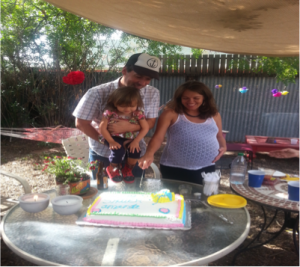 We also want to extend a special thank you to long-term volunteer Amanda Garcés, who has spent countless hours providing us with her invaluable leadership, volunteering with the Wage Theft Clinic, organizing and facilitating workshops for the Promotoras, and working on the campaign to end Operation Streamline in addition to the overall organizational structure of the organization. Without Amanda we couldn’t have done all that we have done this year. We wish her the best during her maternity leave. Thank you, Amanda, from the bottom of our hearts.
We also want to extend a special thank you to long-term volunteer Amanda Garcés, who has spent countless hours providing us with her invaluable leadership, volunteering with the Wage Theft Clinic, organizing and facilitating workshops for the Promotoras, and working on the campaign to end Operation Streamline in addition to the overall organizational structure of the organization. Without Amanda we couldn’t have done all that we have done this year. We wish her the best during her maternity leave. Thank you, Amanda, from the bottom of our hearts.
15 Years Too Many!
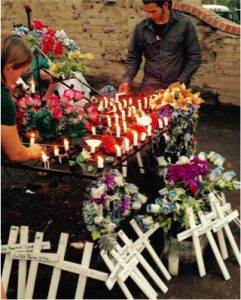 This year we commemorated the 15th year since we began the work to end migrant deaths. In June, for the 786th Thursday in a row, we stood with our community at El Tiradito Shrine for our weekly vigil where we remember and honor those killed by deadly enforcement policies and practices. On El Día de los Muertos, we walked 8 miles from the St. Johns Church to the San Xavier Mission for the 15th time, each of us carrying a cross that represented one of the 137 human beings whose remains were recovered in the Arizona desert this fiscal year. And this marks approximately the 15th year that we have been working with families who are searching for loved ones that have gone missing after crossing the U.S.-Mexico border.
This year we commemorated the 15th year since we began the work to end migrant deaths. In June, for the 786th Thursday in a row, we stood with our community at El Tiradito Shrine for our weekly vigil where we remember and honor those killed by deadly enforcement policies and practices. On El Día de los Muertos, we walked 8 miles from the St. Johns Church to the San Xavier Mission for the 15th time, each of us carrying a cross that represented one of the 137 human beings whose remains were recovered in the Arizona desert this fiscal year. And this marks approximately the 15th year that we have been working with families who are searching for loved ones that have gone missing after crossing the U.S.-Mexico border.
For a decade and a half, Derechos has been making one cross for each set of remains recovered in the Southern Arizona desert. After this year, we now have 2,098 crosses since we began in the year 2000. Most of these crosses carry the word “Unknown” on them, representing how effectively the system disappears people. Contrary to what many believe, we know the system is not broken; it is actually working exactly as intended, putting people in ‘mortal danger’ as stated in the Border Patrol Strategic Plan of 1994. 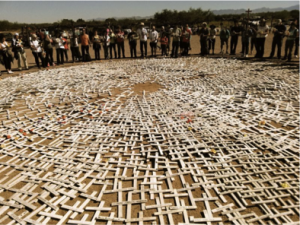
After Derechos members Raquel Rubio-Goldsmith and Isabel García began speaking out in public about the deadly consequences of militarizing the U.S./Mexico border, approximately 15 years ago, we began receiving calls from desperate family members trying to locate their missing loved ones. Fast forward 15 years later, and we receive over 100 calls per month on our Missing Migrant Hotline. We continue to search for people in detention centers and hospitals, Medical Examiner’s Offices and in the desert, when possible, by collaborating with local community search and rescue groups such as No More Deaths in Arizona, Águilas del Desierto in California and the South Texas Human Rights Center in Texas. We don’t want to continue doing this work for another 15 years, but unfortunately don’t see an end in sight any time soon.
We know that, as long as racism and dehumanization prevail, we will continue to receive calls in which groups of people are lost in the desert, people whose only option, too often, is to rely on the same entity that is responsible for both causing them to go lost in the first place and apprehending and deporting them. One recent call that came into our hotline is a perfect example of how being forced to depend on the Border Patrol for rescue can be deadly. When one of us received a call about a group of migrants lost and in bad medical condition in the desert, we along with the family of one of the lost migrants immediately began to call the authorities, asking them to employ their available resources. Instead of receiving the help we sought out, however, we were faced with immediate and deadly indifference. All authorities refused our requests for a search, and we were told by one Border Patrol agent that “We aren’t going to take a helicopter out for just a few subjects.” A few subjects? Or a few human beings? We believe that the only solution to such deadly racism is a dismantling of the entire system that allows for it to exist in the first place.
One very small step in that direction is a collaborative project with No More Deaths that we began in June. Through this project we document moments like the one described above when a potential rescue is denied as well as when 9-11 illegally transfers the phone calls of people in distress, or our phone calls, to the Border Patrol. We also document the many stories that we hear that the Border Patrol will apprehend the majority of the group, knowingly leaving one or more person behind, often to die of dehydration or hypothermia. Lastly, we are documenting how common it is for people to become lost in the detention-center maze after being transferred to private prisons. Many people are denied phone calls, forcing family members to wait in agony to find out what happened to their loved one. We will continue to raise our voices, support families, and collaborate with our partners until there is an end to deaths, abuse, and the dehumanization of migrants.
El Plan Frontera Sur
In July, interns Ruici Ong and Elizabeth Barahona invited Miguel Ángel, (director of Voces Mesoamericanas) and Todd Miller, (author of Border Patrol Nation) to speak at a forum about El Plan Frontera Sur (The Southern Border Program). July marked the first full year since the U.S. began funding the program, which has been directly linked to the increase in violence against Central American refugees crossing through Mexico.
Hearing testimonies from the Southern border by Miguel and Todd gave us even more reason to demand accountability from our government for migrant deaths not only in the U.S., but also in Mexico. They recounted how the U.S.-Mexico border has for several years now been extended all the way to the Mexico-Guatemala border, mirroring the deadly enforcement policies by adding more checkpoints, adding and training more government officials, and spending tens of millions of dollars on surveillance equipment. Effectively, the U.S. government has outsourced and funded a plan that knowingly kills people, forcing Central American migrants into dangerous routes as another form of prevention through deterrence. The deterrent in this context is, conveniently, organized crime, gang violence, and raids by abusive government officials. The opportunity to learn from others who have seen along the Guatemala-Mexico border what we have witnessed over the last 20 years along the U.S. Mexico border gives us even more reason to keep fighting. We won’t stand by while the U.S. and Mexican governments kill people and get away with it.
The Wage Theft Clinic
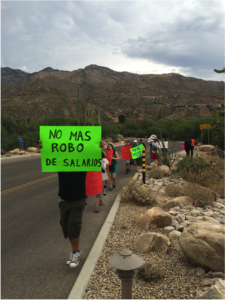 In August, we had to make a difficult decision to close The Wage Theft Clinic, an important resource for workers, but not without first making some noise and successfully recovering over 18,000 in stolen wages.
In August, we had to make a difficult decision to close The Wage Theft Clinic, an important resource for workers, but not without first making some noise and successfully recovering over 18,000 in stolen wages.
Derechos’s Wage Theft Clinic was not a service being provided; it was an organizing tool where workers came either already empowered to take action against their unscrupulous employers or who became empowered by the workshops in the clinic.
Essentially, the clinic provided workers with a space to create a strategy to demand payment of their wages, connect with other workers also facing wage theft, and to become part of a bigger movement to end this abuse. At the same time, Derechos collaborated with the Worker Rights Clinic at the University of Arizona creating a parallel legal system for those workers whose cases had a legal remedy. Some cases were won with only our direct action while others were successful only when both direct action and legal support were combined.
This summer, nine workers were employed to perform janitorial services at a high-end resort that hired subcontractors who then refused to pay their earned wages. Outraged workers came to the clinic by word of mouth, took our Know Your Rights Workshop and after several actions, which included a direct action in front of the resort that was widely documented by the media. Attorneys at the Worker Rights Clinic subsequently settled the case.
The unpaid wages created very difficult personal ramifications for each worker. Sarah, for example, had depended on this money to pay rent, and was then humiliated by having to go to court and to face eviction from her home. It was the resilience of the workers that made this case special. They came together every Tuesday to strategize, learn, and fight for what they had worked for; they declined several settlement offers and recovered what they were owed.
The clinic was a beautiful space but we had to make the difficult decision to close it. This very essential and necessary resource needs long-term funding and at least one staff person. We will continue looking for grants and see this closing as temporary.
Las Promotoras
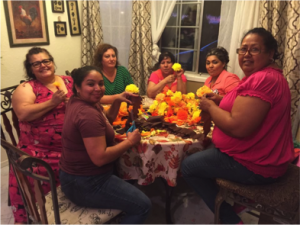 Las promotoras de Derechos Humanos are an integral part of the work that we do. Whether or not they were making flowers for the Día de los Muertos pilgrimage as in the picture below or planning a fundraiser party for Isabel García when she retired as the Director of the Public Defender’s Office and Anna Ochoa O’Leary when she became the director of the Mexican American Studies Department at the University of Arizona, the work that they do is invaluable in the community. The promotoras have raised several thousands of dollars over the last year to support the overall work and have been an incredibly important part of Derechosl. We love them and the community loves them. This summer, nine promotoras, some long- term and others new took several workshops prepared by Amanda Garcés, which inluded the current political context, private prisons, leadership models and participated in several community events. These amazing women then take this knowledge and share it with the community, constantly empowering and educating others, creating a more united Tucson.
Las promotoras de Derechos Humanos are an integral part of the work that we do. Whether or not they were making flowers for the Día de los Muertos pilgrimage as in the picture below or planning a fundraiser party for Isabel García when she retired as the Director of the Public Defender’s Office and Anna Ochoa O’Leary when she became the director of the Mexican American Studies Department at the University of Arizona, the work that they do is invaluable in the community. The promotoras have raised several thousands of dollars over the last year to support the overall work and have been an incredibly important part of Derechosl. We love them and the community loves them. This summer, nine promotoras, some long- term and others new took several workshops prepared by Amanda Garcés, which inluded the current political context, private prisons, leadership models and participated in several community events. These amazing women then take this knowledge and share it with the community, constantly empowering and educating others, creating a more united Tucson.
Operation Streamline and the Criminalization of Migrants
Since Operation Streamline began, hundreds of thousands of human beings have received sentences of incarceration and a permanent criminal record for the “crime” of crossing the border to seek safety and economic justice for themselves and their families.
In April 2015, Derechos Humanos in collaboration with Grassroots Leadership, and AFSC of Arizona hosted a National Strategy Session bringing representatives from along the Southern border in addition to those who work in Washington DC. The strategy session was successful and groups were able to share their work and collectively strategize on next steps. You know a convening is successful if you come out with action items–two highlights were regional sessions and a national week of action.
On September 19, Derechos Humanos, the End Streamline Coalition, and the American Friends Service Committee convened our regional conference with representatives from 14 different Tucson organizations. Grassroots leadership followed a week later convening several organizations in Texas.
Currently, there is one resolution in the senate and one in the house praising operation streamline. Both are identical and calls for a “sense” of the Senate and House that a little-known federal immigrant-prosecution program, Operation Streamline, is a “success” that should be continued and expanded. On the contrary, we believe this extremely expensive, inhumane, and embarrassing program has not been proven effective in reducing migration, even according to the Department of Homeland Security’s own Office of Inspector General. The OIG’s recent audit did NOT substantiate the claims of Streamline’s “success,” and also noted that the Border Patrol may be violating international treaties by prosecuting refugees.
We have an online petition going to ensure that this “little known federal immigrant-prosecution program is known not for “sense” but for its inhumanity and waste of tax-payers money. You can find the petition at http://afscarizona.org/tag/operation-streamline/
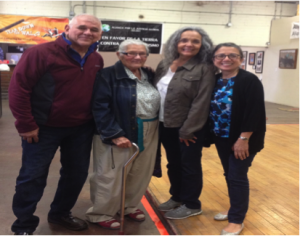 December 16, 2015 marks the tenth year since Operation Streamline was instituted in Del Rio, Texas, which was then expanded to Yuma in 2006, to Tucson in 2008 and since to all Texas, Arizona, and New Mexico sectors. This date also happens to coincide with Human Rights Week, so from December 10 to 16, be on the lookout for information about a week of action. Join us in the fight to end this system of injustice that wreaks havoc on our communities. For more information, watch Isabel Garcia’s plenary talk at Netroots Nation about Operation Streamline, which can be found on YouTube at https://www.youtube.com/watch?v=Lr0Fj6Ij04g
December 16, 2015 marks the tenth year since Operation Streamline was instituted in Del Rio, Texas, which was then expanded to Yuma in 2006, to Tucson in 2008 and since to all Texas, Arizona, and New Mexico sectors. This date also happens to coincide with Human Rights Week, so from December 10 to 16, be on the lookout for information about a week of action. Join us in the fight to end this system of injustice that wreaks havoc on our communities. For more information, watch Isabel Garcia’s plenary talk at Netroots Nation about Operation Streamline, which can be found on YouTube at https://www.youtube.com/watch?v=Lr0Fj6Ij04g
La Tumba de los Asesinados
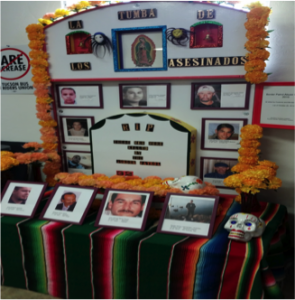 This year, local Tucson artist and Derechos member, Pancho Medina, built an altar for the office, which he called La Tumba de los Asesinados to commemorate the dozens of murders by Border Patrol agents over the last twenty years. Every day this altar reminds us to keep fighting against a system that allows Border Patrol agents to thoughtlessly murder human beings with total impunity. It is a system in which law enforcement agents can be caught on video killing someone and still not face any charges, as we recently saw in the case of Anastacio Hernández. It is a system where there are no repercussions for shooting someone four times in the back as in the case of Carlos LaMadrid or fire ten rounds across the U.S. Mexico border fence from 20 to 25 feet above, as in the case of 16- year-old José Antonio Elena Rodriguez. These are only a few examples of the many who have lost their lives to deadly border enforcement. Thank you, Pancho for giving us a place in which we can reflect on their lives and their deaths. We will not forget them.
This year, local Tucson artist and Derechos member, Pancho Medina, built an altar for the office, which he called La Tumba de los Asesinados to commemorate the dozens of murders by Border Patrol agents over the last twenty years. Every day this altar reminds us to keep fighting against a system that allows Border Patrol agents to thoughtlessly murder human beings with total impunity. It is a system in which law enforcement agents can be caught on video killing someone and still not face any charges, as we recently saw in the case of Anastacio Hernández. It is a system where there are no repercussions for shooting someone four times in the back as in the case of Carlos LaMadrid or fire ten rounds across the U.S. Mexico border fence from 20 to 25 feet above, as in the case of 16- year-old José Antonio Elena Rodriguez. These are only a few examples of the many who have lost their lives to deadly border enforcement. Thank you, Pancho for giving us a place in which we can reflect on their lives and their deaths. We will not forget them.
Welcome to the Derechos Team, Dévora González!
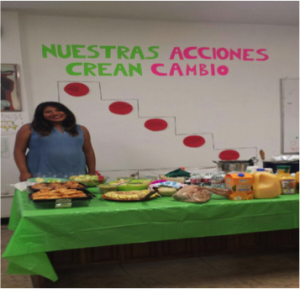 After volunteering her time with us for over a year, we were able to officially bring Dévora onto the Derechos Missing Migrant Hotline Team as a part-time staff member. Dévora moved here from Los Ángeles to complete a Masters Degree in Latin American Studies two years ago and decided to stay. We are so lucky to have her! She brings with her a fierce passion for helping families, who like her own, have had to endure the agony of not hearing from a loved one and thinking the worst. She also just welcomed her baby boy into this world only four months ago, and is an amazing mother who inspires us all. Thank you Dévora–you are an invaluable part of the work that we do!
After volunteering her time with us for over a year, we were able to officially bring Dévora onto the Derechos Missing Migrant Hotline Team as a part-time staff member. Dévora moved here from Los Ángeles to complete a Masters Degree in Latin American Studies two years ago and decided to stay. We are so lucky to have her! She brings with her a fierce passion for helping families, who like her own, have had to endure the agony of not hearing from a loved one and thinking the worst. She also just welcomed her baby boy into this world only four months ago, and is an amazing mother who inspires us all. Thank you Dévora–you are an invaluable part of the work that we do!
Volunteer with Us!
We could not do this work without volunteers and interns. If you would like to volunteer, there are a variety of opportunities to become involved:
-Join the Detention Center Call Team for the Missing Migrant Project
– Join the Missing Migrant Project Case Facilitation Team
-Help us with social media, website, graphic design, event planning and fundraising.
-Conduct surveys for the abuse documentation project we are working on with No More Deaths If you would like to join any of these opportunities, please contact volunteer@derechoshumansaz.net, and we will e-mail you the application and more info.
Sign up by going to our website, http://www.derechoshumanosaz.net/.
Click on the Donate Here button. Scroll down to the second option which is: convenient recurring monthly donation. Pick the amount you can afford from the drop-down menu. Click the Donate button in the text line and fill out your credit card information. Once a month your card will be automatically charged.
Please Consider Making a Tax-Deductible Donation Today!
Your gift of $25, $50, $100, $500, $1,000 or $5,000 can make all the difference. You can donate by going through our website at http://www.derechoshumanosaz.net/ and clicking on the “Donate” button. Or you can send a check in the enclosed envelope sign up for monthly donations with our enclosed form. Please consider being a monthly sustainer, and see your donation go a long way.
We have a lot of work to do! A Community United is a Strong Community Coalición de Derechos Humanos – PO Box 1286, Tucson AZ, 85702 – 520-770-1373 coalicion@derechoshumanosaz.net – www.derechoshumanosaz.net
